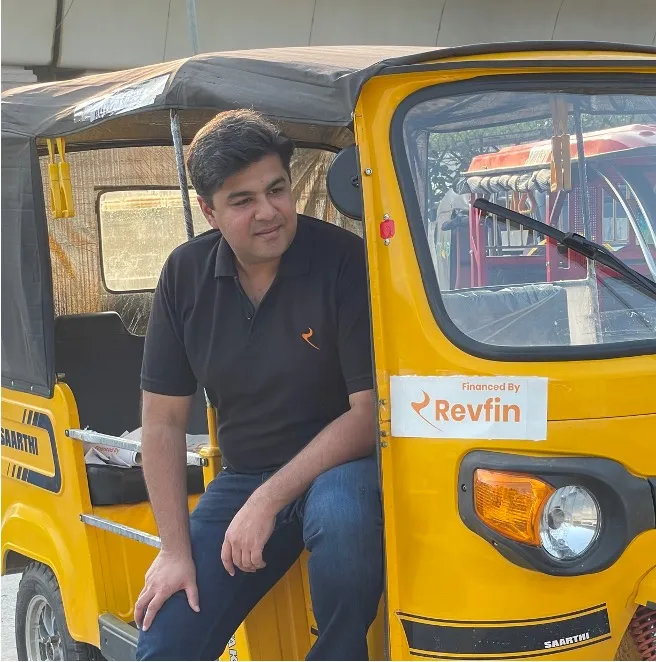How a trip to India prompted RevFin founder to look at data-backed lending for EVs
The Turning Point is a series of short articles that focuses on the moment when an entrepreneur hit upon a winning idea. This week, we look at the lending platform for electric vehicles, RevFin.
There are more electric vehicles (EVs) on Indian roads than ever before. However, EVs don’t come cheap, with four-seaters starting from Rs 8.5 lakh. This is the gap EV financing platform wants to bridge by providing EV digital lending options.
The Delhi-based startup provides individual drivers with financing products for different types of EVs (e2W, e3W, L5, and small fleets through OEMs) by overcoming consumer underwriting and product risks.
Founded in 2018 by Sameer Aggarwal, it raised a Series A round of $10 million in October this year in a combination of equity and debt, taking the total funding raised to $25 million.
Beyond traditional credit scoring
Before starting up, Sameer worked with HSBC and digital micro-lender Oakam in London—which he calls a transition from a large bank with an excellent customer base to a subprime lender.
“I realised that the traditional methods of underwriting using credit bureau and banking transaction data do not work for the subprime credit population. To create a process for digitally underwriting subprime customers, I experimented with many ideas like self-psychometrics, machine learning algorithms, and gamification,” the Founder and CEO of RevFin tells YourStory.
A trip to India made him realise that the availability and quality of credit bureau and banking transaction data for those with prime credit scores in the country were similar to the subprime base in the UK.
“One thing was clear—a lending platform that relies on traditional credit bureau and banking transaction data will never be scalable,” says Sameer. He realised that a lending platform cannot underwrite customers who do not have the required data, which can differ with geography/country.
A truly globally scalable lending platform has to rely on data that users generate through engagement with the lending platform. This can be done using biometrics, psychometrics, and gamification in loan applications as every user can create data specific to them, irrespective of where they live.
This is what led Sameer and the RevFin team to develop a proprietary method that uses psychometrics, biometrics, telematics, gamification, and geo-limiting to underwrite risks. This helps the EV financing platform verify borrowers' identities and digitally disburse loans, keeping NPAs low (less than 2%).
“We are solving the problem for 44% of Indians who are financially excluded and cannot get a loan for buying an income-generating vehicle,” says Sameer. “We are trying to solve for financial inclusion as India has a huge credit gap driven by lack of education, geography, language barriers, and credit footprint. With our loan underwriting platform, we can underwrite first-time borrowers and even those who cannot read or write very well.”

Sameer Aggarwal, Founder and CEO, RevFin
From B2B to B2C, how EMotorad founders found the right match for e-bikes in India
New goals
The journey was not without challenges.
“While we have been lucky so far, we did fumble and tumbled a little bit but that taught us lessons which have strengthened our financial and business model. We now engage with our OEMs in a manner that they also have skin in the game, making our unique digital underwriting stronger,” Sameer says.
With its differentiated distribution model, RevFin plans to build a lending book of Rs 3,000 crore in the next five years and targets a 20% return on equity (RoE).
By March 2023, the company plans to use the funds raised to expand its geographical footprint from 14 to 25 states, and capture over 10% of the national market for financing electric three-wheelers (e3W). RevFin has set an ambition for financing two million electric vehicles in the next five years. The company has already financed over 10,000 electric three-wheelers in 14 states.
To meet its goals, the company evolved its products and services over the last four years. Starting with loans for e3Ws, it has added newer financial products such as leasing and lending not just for L3 but for all vehicles engaged in last-mile and mid-mile connectivity, and for ecommerce logistics.
The startup also recently started financing two-wheelers used for ecommerce and last-mile deliveries, including food deliveries. It also plans to get into four-wheeler financing—both rideshare taxis as well as trucks for cargo deliveries.
RevFin is currently fully operational in 14 states with 400 dealerships. It is gradually increasing both the reach and OEM partnership, and has already disbursed over $16 million.
Edited by Kanishk Singh







